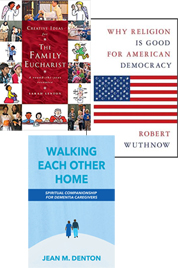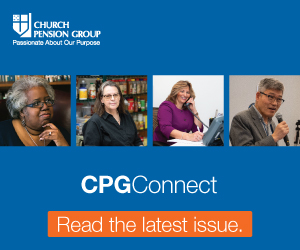Summer is here and time to relax with a good book to take you to far away places, or help you get caught up with day-to-day topics of interest. Episcopal Journal offers an assortment of books to perk your interest.

This month we suggest:
Liturgical Resources: All ages around the table
“Creative Ideas for the Family Eucharist: A Round-the-Year Resource� By Sarah Lenton, Canterbury Press, pp. 384, $40
A priest of the Church of England, Sarah Lenton’s book is the latest of many since the 1990s that offer ready-made resources for those looking to lead child-focused worship. Unlike so many of those other texts, this one will provide worship leaders with clear and sound guiding principles, as well as scripts for focused, interactive sermons.… The opening chapters are reason enough to buy the book, especially for a worship leader who is either new to High Church liturgy or looking to involve children more authentically in worship. …
— Review by Emily J. Garcia for The Living Church
Politics and Religion: Better democracy through disagreement?
“Why Religion Is Good for American Democracy� By Robert Wuthnow, Princeton University Press, pp. 328, $27.50
Robert Wuthnow’s informative work is filled with insights about religions’ role in American democracy. Religions, he claims, oppose tyranny because of the conflicts they generate; contribute to liberty of conscience through the “multiple options� set forth on participation in war; require freedom of assembly to accommodate their diverse forms; promote human dignity across the political spectrum by addressing indignities; keep alive discussions of inclusion on emigration and citizenship, and on wealth disparity through the prosperity gospel, philanthrocapitalism, faith-friendly initiatives, and Catholic social teaching; and lead debate on health and vaccines through “resistance, adaption, and advocacy�.
Reading this … one might have presumed that religions are good for American democracy because of their unifying or reconciling character, but Wuthnow makes the opposite claim. The diversity and disagreements religions produce, internally and externally, require democratic means for their accommodation. Religion is good not as a unifying force but “because of religion’s capacity to bring diverse values, interests, and moral claims into juxtaposition with one another.� …
— Review by D. Stephen Long for The Living Church
Spiritual Guidance: Strength for a demanding journey
“Walking Each Other Home: Spiritual Companionship for Dementia Caregivers� By Jean Denton, Morehouse Publishing, pp. 176, $16.95
…Within five years, I will be a caregiver for my parents, one of whom, while not having Alzheimer’s, is probably on the way to a dementia diagnosis. I am far from the only one who will experience life in this manner. This makes Jean M. Denton’s “Walking Each Other Home� vitally important.
Companionship is the key for those undergoing a life with this diagnosis. As Denton points out early on: “No dementia is solitary, especially for those whose lives have intertwined. We walk together, caregiver and care recipient, each having a different experience with the same dementia. We walk together even if we are living apart. We walk each other home, even though dementia takes us to different destinations.â€? Both of the people within the bond of caring need companionship, and often the spiritual aspect is neglected. “Walking Each Other Homeâ€? addresses this need. …
— Review by Christine Havens for The Living Church


